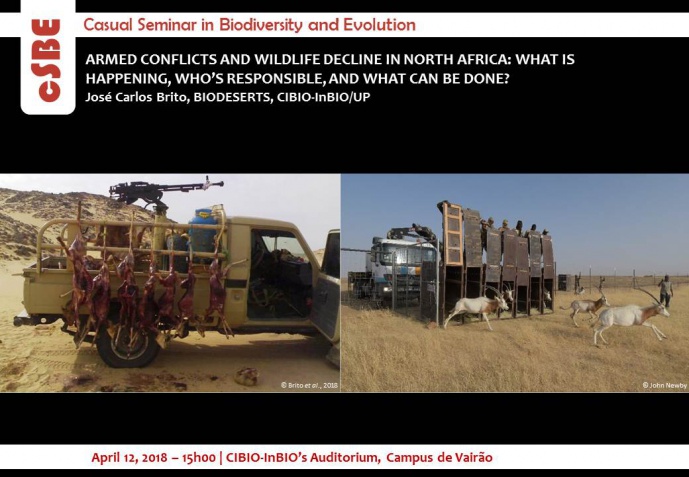ARMED CONFLICTS AND WILDLIFE DECLINE IN NORTH AFRICA: WHAT IS HAPPENING, WHO’S RESPONSIBLE, AND WHAT CAN BE DONE?

CASUAL SEMINAR IN BIODIVERSITY AND EVOLUTION

Last year, I’ve gave a seminar at CIBIO expressing how increasing conflicts and social insecurity are expected to accelerate biodiversity decline and escalate illegal wildlife killing. In the Sahara-Sahel, megafauna has experienced recent continuous decline due to unsustainable hunting pressure. The best available data on distribution and population trends of threatened, large vertebrates, illustrated how escalating regional conflict (565% growth since 2011) was hastening population decline in areas that were formerly refugia for megafauna. Without conservation action, the unique and iconic biodiversity of Earth's largest desert will be forever lost. These findings generated multiple questions from the audience about what can be done to revert the situation. Given the overwhelming magnitude of the problem, I shrugged the shoulders and provided no clear answer. Stimulated by this challenge, in this seminar, I will now address several actions that can be made for reverting wildlife decline and for making strong policy change. These include:
(1) establishing strong commitments for change in global attitude toward nature;
(2) engraining a culture of environmental responsibility among all stakeholders;
(3) fostering environmental awareness to drive societal change;
(4) reinforcing regional security and firearms control;
(5) implementing local research and wildlife monitoring schemes.
The relevant international partners needed to tackle these challenges and to make strong policy change for biodiversity conservation and regional stability are identified.
José Carlos Brito completed his PhD in 2003 and he is a member of CIBIO-InBIO since then. Currently he is the Principal Investigator of the group BIODESERTS at CIBIO-InBIO.
Image credits: Brito et al. (2018) and John Newby